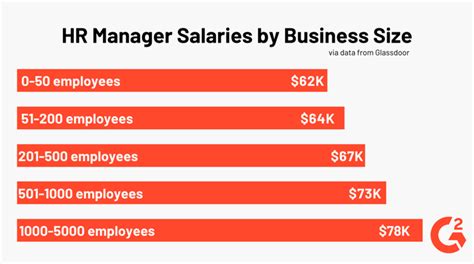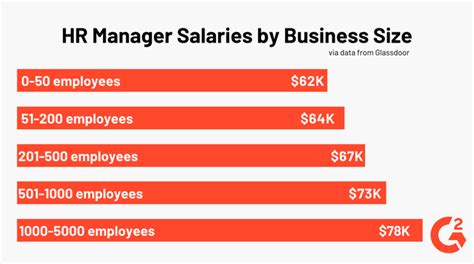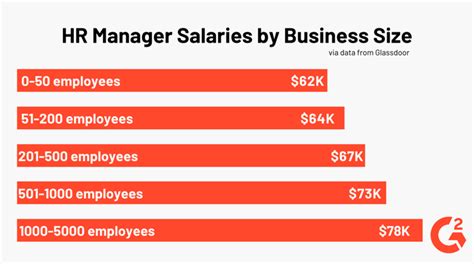Intro
Unlock the latest insights on Human Resources Manager salaries across the nation. Discover national averages, trends, and factors influencing HR manager compensation. Get the inside scoop on industry standards, regional variations, and the impact of experience and industry on salary ranges. Stay ahead in the HR job market with our comprehensive guide.
As the backbone of any organization, human resources (HR) managers play a vital role in ensuring the smooth operation of a company's workforce. From recruitment and talent management to benefits administration and conflict resolution, HR managers are responsible for a wide range of tasks that impact the overall success of a business. Given the importance of this role, it's no surprise that HR manager salaries can vary significantly depending on factors such as location, industry, experience, and company size. In this article, we'll delve into the national averages and trends for HR manager salaries, providing valuable insights for both HR professionals and employers.
The Importance of HR Managers in Modern Business
In today's fast-paced business environment, HR managers are more than just administrators; they are strategic partners who help drive organizational growth and success. From developing and implementing effective recruitment strategies to fostering a positive and inclusive company culture, HR managers are instrumental in creating a work environment that attracts, retains, and engages top talent. As such, their contributions can have a direct impact on a company's bottom line, making them an essential part of any organization.
National Averages for HR Manager Salaries
According to data from the Bureau of Labor Statistics (BLS), the median annual salary for HR managers in the United States was $123,510 in May 2020. However, salaries can vary significantly depending on factors such as location, industry, experience, and company size. Here are some national averages for HR manager salaries based on industry:

- Healthcare and social assistance: $113,110
- Finance and insurance: $124,490
- Manufacturing: $108,610
- Professional and business services: $129,110
- Government: $104,410
Trends in HR Manager Salaries
While national averages provide a general idea of HR manager salaries, it's essential to consider trends and factors that can impact salaries. Here are some trends to watch:
- Growing demand for HR professionals: The BLS predicts a 6% growth in employment opportunities for HR managers from 2020 to 2030, faster than the average for all occupations.
- Increased focus on diversity, equity, and inclusion: As companies prioritize creating a more diverse and inclusive workplace, HR managers with expertise in these areas can expect higher salaries.
- Technological advancements: The use of HR technology, such as artificial intelligence and machine learning, is becoming more prevalent, and HR managers with technical skills can command higher salaries.
- Shift to remote work: The COVID-19 pandemic has accelerated the shift to remote work, and HR managers who can effectively manage remote teams and create virtual work environments may be in higher demand.
Factors That Impact HR Manager Salaries
While industry and location are significant factors in determining HR manager salaries, other factors can also impact salary ranges. Here are some key considerations:
- Experience: More experienced HR managers tend to earn higher salaries, with median salaries ranging from $80,000 for entry-level positions to over $150,000 for senior roles.
- Education: A bachelor's degree in human resources, business, or a related field is often required for HR manager positions, and advanced degrees or certifications can increase earning potential.
- Certifications: Professional certifications, such as the Society for Human Resource Management (SHRM) Certified Professional (SHRM-CP) or the HR Certification Institute (HRCI) Certified Professional (PHR), can demonstrate expertise and commitment to the field, leading to higher salaries.
- Company size: HR managers in larger companies tend to earn higher salaries, with median salaries ranging from $90,000 in small companies to over $140,000 in large companies.

Regional Variations in HR Manager Salaries
HR manager salaries can vary significantly depending on location, with cities on the East and West Coasts tend to have higher salaries than cities in the Midwest and South. Here are some regional averages for HR manager salaries:
- Northeast: $134,490
- West Coast: $129,110
- South: $114,610
- Midwest: $108,610

Conclusion
HR manager salaries can vary significantly depending on factors such as location, industry, experience, and company size. As the demand for HR professionals continues to grow, it's essential for both HR managers and employers to stay informed about national averages and trends. By considering these factors and trends, HR managers can negotiate fair salaries, and employers can attract and retain top talent in the field.
We hope this article has provided valuable insights into HR manager salaries. If you have any questions or would like to share your thoughts on this topic, please leave a comment below.
What is the average salary for an HR manager in the United States?
+The median annual salary for HR managers in the United States was $123,510 in May 2020, according to the Bureau of Labor Statistics.
What factors can impact HR manager salaries?
+Factors that can impact HR manager salaries include experience, education, certifications, company size, and location.
What is the job outlook for HR managers?
+The Bureau of Labor Statistics predicts a 6% growth in employment opportunities for HR managers from 2020 to 2030, faster than the average for all occupations.

